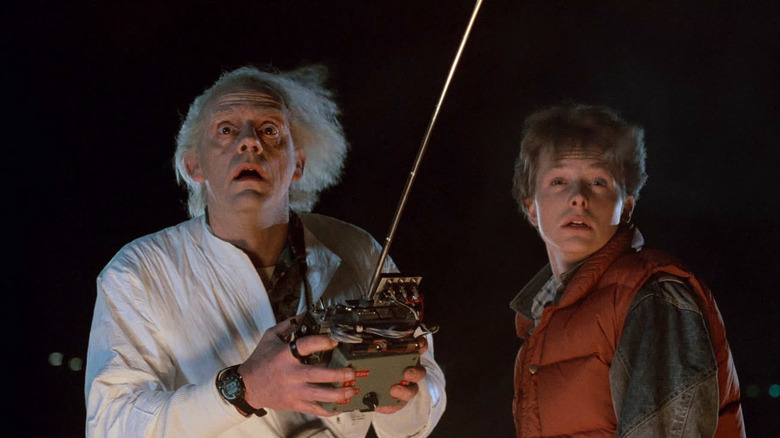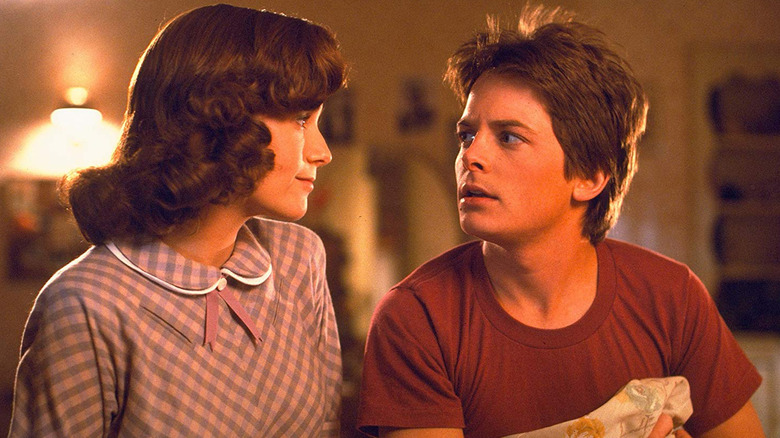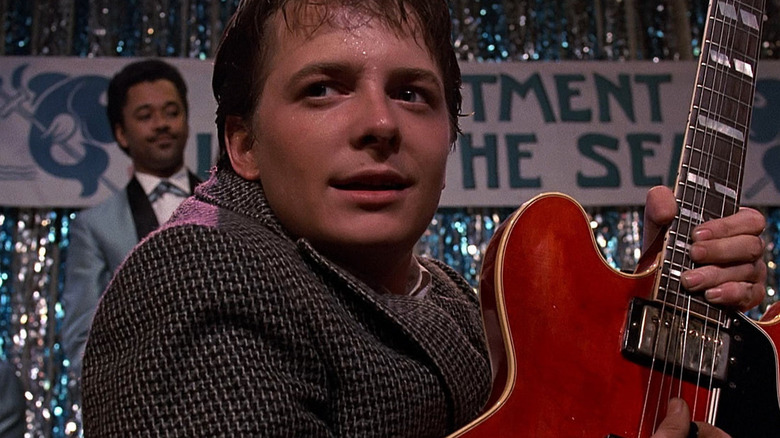Why Back To The Future's Writer Thinks The Sci-Fi Classic Couldn't Exist Today
The question of whether a classic film could be made today or not is, ultimately, an oxymoronic one. Every movie ever made is a product of its age, in ways that are intentional and entirely incidental, and therefore the easy answer to that question is that no movie could be made in another era not its own and remain exactly the same. Despite that truth, people keep wondering about what an old movie might look like in our modern era, which only further indicates that what we're really talking about is the differences between two different time periods. For some folks, watching a classic film with modern eyes — whether after a long period of not watching it or watching it for their first time ever — has the same effect as if they'd actually accidentally traveled back in time.
The clash of cultures between the modern day and the not-so-rosy past is precisely the impetus behind the classic 1985 sci-fi adventure comedy "Back to the Future," written by Robert Zemeckis and Bob Gale and directed by Zemeckis. It's a movie about an '80s teen, Marty McFly (Michael J. Fox), who accidentally gets stuck in 1955, whereupon he meets his parents who are at his same age. In addition to the film concerning Gale's core concept of whether he and his own father would've been friends had they been contemporaries, the movie pokes holes in the image of both the 1980s and the 1950s. It's a satirical approach that allows the film to be both timely and timeless.
The movie's saturation in its two time periods is one big reason why you couldn't make "Back to the Future" today and have it end up being the same. According to Gale, this is only one of a long list of reasons why elements of the movie wouldn't fly. While Gale's observations are objectively correct, they're a little reactionary, and whether intentionally or not, they hit upon the differences in the culture of the 1980s and our culture in 2025.
'Back to the Future' may still be enjoyed by all ages, but it's a product of its time
As Gale opined when speaking to The Guardian (via Cracked) on the occasion of the 40th anniversary of "Back to the Future," the prospect of making the movie in 2025 would highly likely mean it'd never get made:
"Oh man, the film wouldn't even be made today. We'd go into the studio, and they'd say, 'What's the deal with this relationship between Marty and Doc?' They'd start interpreting pedophilia or something. There would be a lot of things they have problems with."
Indeed, as this observation hints at, there's a lot to unpack in "Back to the Future" from a modern viewpoint. Setting aside the obvious political changes — Emmett "Doc" Brown (Christopher Lloyd) is gunned down by a rogue bunch of Libyan terrorists — there are numerous cultural differences between then and now in the film. A lot of this stems from how critics, comedians, and other cultural commentators have made snarky observations about how odd the characters and the premise of the movie seem when taken at face value. In addition to the unusually close relationship between Marty and Doc, there is the incest plotline concerning Marty and his teen mother, Lorraine (Lea Thompson), and the gag where Marty's guitar playing at a school dance supposedly inspires Chuck Berry to create rock n' roll music, implicitly giving the credit for Black cultural innovation to a white kid.
Yet Gale is also coming at his observation from a place of remembrance, as it's not just that the movie would likely be rejected today; it was very nearly rejected by every major studio in the mid-'80s, too, for several similar reasons. "Back to the Future" is an adventure comedy, after all, and as we've seen throughout the history of cinematic comedy, it's a genre that tends to age poorly due to the constantly changing culture and standards. Despite the film crossing the space-time barrier, there's no doubt that "Back to the Future" is a product of its time.
'Back to the Future' is a family-friendly sci-fi adventure, but it's also sly cultural satire
What Gale and Thompson hit upon in their recent interview is that the core of "Back to the Future" is cultural commentary. For her part, Thompson points out that the difference between 2025 and 1995 is a unique one, distinct from the more surreal gap between 1985 and 1955:
"If you made 'Back to the Future' in 2025 and they went back 30 years, it would be 1995 and nothing would look that different. The phones would be different but it wouldn't be like the strange difference between the '80s and the '50s and how different the world was."
Indeed, while there could be plenty of culture shock to mine in a "Back to the Future" made today, there wouldn't be that instantaneous shock of aesthetics that the '80s versus the '50s provided in the film. The contrast and confluence of those two particular time periods are part of what makes the film so special, particularly because it allows Zemeckis' brand of satire to shine. "Back to the Future," like the majority of Zemeckis' films, is a subversive and slyly cynical satire in the way it points out the hollow core of both the materialistic '80s and the supposedly squeaky-clean (yet anything but) 1950s. All of the cultural differences in the film aren't there arbitrarily, or just to push the envelope. Is Marty's inadvertent "invention" of rock n' roll a clueless gag that accidentally rewards our All-American white hero? Or was there a reason Zemeckis and Gale were so happy to cast Fox, then famous for playing a neo-conservative son to liberal parents on TV's "Family Ties," in the role of a kid who only gets rewarded for making several near-disastrous mistakes?
If there's a problem with "Back to the Future," it's that Zemeckis and Gale made a movie that is so fascinating and entertaining that its satire can get lost in the shuffle. It sure did for co-star Crispin Glover, and it even did with general audiences, who saw the movie's cliffhanger ending gag as a promise for a sequel that Zemeckis and Gale never intended to actually make. So while "Back to the Future" may no longer function as an observation about our current culture, it's invaluable as a time capsule all its own, both of the 1980s and the way that decade looked back askance at the 1950s. "Back to the Future" could not and would never be made today, but there's more than enough room for someone else to make a cultural commentary just as incisive, sly, and entertaining.


